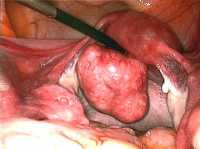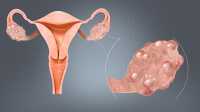Infertility- What Are My Options?
 Although we might not all have grown up knowing for sure if children were in our future, or already have our baby names picked out - James if it’s a boy Violet if it’s a girl - having the decision whether or not to have children taken away from us, due to biological issues inside our bodies, can be devastating.
When trying to have children, it can of course, become very frustrating when you aren’t getting pregnant. If you find this is the case, it is recommended that you go to the doctor after one year of failing to conceive. It’s always a good idea to get tested to really understand what is happening in your body. The main signs a woman may be infertile is if her menstrual cycles are too long (35 days or more) or are too short (21 days or less).
When going for fertility tests, it is good to have an idea of what to expect. For women, samples of blood will most likely be tested to check for the presence of the hormone Progesterone. For men, a semen sample is obtained for analysis, checking its quality and quantity.
Sitting in a waiting room waiting for the results of yet more testing takes its toll, and it’s easy to feel helpless as the image of the life you had planned drifts further out of reach. Luckily nowadays, these results don’t have to be so final as we finally have other options.
(more…)
Although we might not all have grown up knowing for sure if children were in our future, or already have our baby names picked out - James if it’s a boy Violet if it’s a girl - having the decision whether or not to have children taken away from us, due to biological issues inside our bodies, can be devastating.
When trying to have children, it can of course, become very frustrating when you aren’t getting pregnant. If you find this is the case, it is recommended that you go to the doctor after one year of failing to conceive. It’s always a good idea to get tested to really understand what is happening in your body. The main signs a woman may be infertile is if her menstrual cycles are too long (35 days or more) or are too short (21 days or less).
When going for fertility tests, it is good to have an idea of what to expect. For women, samples of blood will most likely be tested to check for the presence of the hormone Progesterone. For men, a semen sample is obtained for analysis, checking its quality and quantity.
Sitting in a waiting room waiting for the results of yet more testing takes its toll, and it’s easy to feel helpless as the image of the life you had planned drifts further out of reach. Luckily nowadays, these results don’t have to be so final as we finally have other options.
(more…)Significant Number of Postpartum Women Have Severe Complications After Hospital Discharge
Emergency Contraception: Hormonal vs Copper IUDs Compared
Universal Screening for COVID-19 Among Pregnant Women Finds High Incidence of Asymptomatic Infections
Some Women Experience Delay in Fertility After Discontinuing Contraceptives
NEJM Study Compares Treatments for Uterine Fibroids
FDA Approves ORIAHNN™ : First Oral Medication for Heavy Menstrual Bleeding Due to Uterine Fibroids
 Ayman Al-Hendy, M.D., Ph.D.
Investigator for the ELARIS UF-2 clinical trials
Professor of Gynecology
Director of Translational Research
University of Illinois at Chicago
Dr. Al-Hendy discusses the recent announcement that the FDA has approved ORIAHNN™ for the management of heavy menstrual bleeding due to uterine fibroids in pre-menopausal women.
MedicalResearch.com: What is the background for this approval?
Uterine fibroids, commonly referred to as uterine leiomyomas, are the most common type of non-cancerous tumor known to impact women of reproductive age (30-50 years old). In fact, studies show that uterine fibroids can occur in up to 70 percent of European American women and over 80 percent of African American women by age 50. As a result of uterine fibroids, women can experience a range of symptoms, the most common being heavy menstrual bleeding (i.e. prolonged and/or frequent bleeding), which can lead to other health effects such as anemia, fatigue, pelvic pain, urinary frequency etc.
Uterine fibroid treatment recommendations have historically been based on the size and location of the fibroid(s). When treating larger and more complicated fibroids, healthcare providers have typically believed that surgery is their best course of action, which has made uterine fibroids the leading reason for the hysterectomies performed in the U.S. The FDA approval of ORIAHNN was based on improving care for uterine fibroid sufferers who have had a negative impact on their quality of life due to disruptive symptoms. What makes the approval of ORIAHNN so exciting, is that women now have an oral therapy to directly address heavy menstrual bleeding due to uterine fibroids.
(more…)
Ayman Al-Hendy, M.D., Ph.D.
Investigator for the ELARIS UF-2 clinical trials
Professor of Gynecology
Director of Translational Research
University of Illinois at Chicago
Dr. Al-Hendy discusses the recent announcement that the FDA has approved ORIAHNN™ for the management of heavy menstrual bleeding due to uterine fibroids in pre-menopausal women.
MedicalResearch.com: What is the background for this approval?
Uterine fibroids, commonly referred to as uterine leiomyomas, are the most common type of non-cancerous tumor known to impact women of reproductive age (30-50 years old). In fact, studies show that uterine fibroids can occur in up to 70 percent of European American women and over 80 percent of African American women by age 50. As a result of uterine fibroids, women can experience a range of symptoms, the most common being heavy menstrual bleeding (i.e. prolonged and/or frequent bleeding), which can lead to other health effects such as anemia, fatigue, pelvic pain, urinary frequency etc.
Uterine fibroid treatment recommendations have historically been based on the size and location of the fibroid(s). When treating larger and more complicated fibroids, healthcare providers have typically believed that surgery is their best course of action, which has made uterine fibroids the leading reason for the hysterectomies performed in the U.S. The FDA approval of ORIAHNN was based on improving care for uterine fibroid sufferers who have had a negative impact on their quality of life due to disruptive symptoms. What makes the approval of ORIAHNN so exciting, is that women now have an oral therapy to directly address heavy menstrual bleeding due to uterine fibroids.
(more…)Effect of Support Tool on Rates of Trial of Labor After Previous Cesarean Delivery
Are Too Many Pregnant Women Being Diagnosed and Treated for Thyroid Disease?
Risks & Benefits to Children of Maternal Antenatal Corticosteroids
 Katri Räikkönen
Professor, Department of Psychology and Logopedics
University of Helsinski
MedicalResearch.com: What is the background for this study?
Response: Maternal antenatal corticosteroid treatment is standard care when there is a risk for preterm delivery. The treatment improves the prognosis of babies born preterm.
In high-income countries, antenatal corticosteroid treatment has been in routine use for over 30 years. Recommendations and clinical care guidelines for maternal antenatal corticosteroid treatment differ between continents and countries. In Finland the treatment is currently recommended when the risk for preterm delivery is at 34 gestational weeks or less. In select cases, the treatment is recommended even later in gestation. Corticosteroids accelerate fetal maturation, especially in the lungs, and increase the child’s resilience to the stress that results from being born preterm.
However, antenatal corticosteroids not only cross the placenta, but also cross the the blood-brain barrier and may harm fetal brain development. We are not aware of previous population-based studies that would have tested if maternal antenatal corticosteroid treatment would be associated with mental and behavioral disorders in children and we are not either aware of studies that would have tested if any associations would be explained by shared genetic or familial factors.
(more…)
Katri Räikkönen
Professor, Department of Psychology and Logopedics
University of Helsinski
MedicalResearch.com: What is the background for this study?
Response: Maternal antenatal corticosteroid treatment is standard care when there is a risk for preterm delivery. The treatment improves the prognosis of babies born preterm.
In high-income countries, antenatal corticosteroid treatment has been in routine use for over 30 years. Recommendations and clinical care guidelines for maternal antenatal corticosteroid treatment differ between continents and countries. In Finland the treatment is currently recommended when the risk for preterm delivery is at 34 gestational weeks or less. In select cases, the treatment is recommended even later in gestation. Corticosteroids accelerate fetal maturation, especially in the lungs, and increase the child’s resilience to the stress that results from being born preterm.
However, antenatal corticosteroids not only cross the placenta, but also cross the the blood-brain barrier and may harm fetal brain development. We are not aware of previous population-based studies that would have tested if maternal antenatal corticosteroid treatment would be associated with mental and behavioral disorders in children and we are not either aware of studies that would have tested if any associations would be explained by shared genetic or familial factors.
(more…)USPSTF Issues Screening Guidelines Screening for Bacterial Vaginosis in Pregnancy to Prevent Preterm Delivery
If a patient is experiencing signs or symptoms of bacterial vaginosis, such as vaginal discharge or a bad odor, they...
Expecting the Unexpected: Pregnancy and a Pandemic
More Cesarean Deliveries Linked to Decline in US Birth Weights
Elagolix – ORILISSA® – for Heavy Menstrual Bleeding in Women with Uterine Fibroids
Within-Hospital Racial Disparities in Maternal Complications Persist
Study Finds 60-Second Cord-Clamping Safe for Women Undergoing C-Section
Cervical Cancer Prevention: New Test May Better Target Women Who Need Treatment
Risk Factors for Prolonged Opioid Use After Childbirth Identified
This work confirms the high prevalence of opioid prescribing demonstrated in prior studies and the long-term impact of this prescribing:...
USPSTF: All Pregnant Women Should Be Screened for Hepatitis B
Preterm Babies Less Likely To Have Romantic Relationships as Adults
Is There a Link Between Benzodiazepines During Pregnancy and Childhood ADHD?
Minimally Invasive Uterine Fibroid Embolization Reduces Bleeding Risk and Preserves Uterus
Simple Urine Test May Allow Pregnant Women to Detect Preeclampsia at Home
Steroids for Risk of Late Preterm Delivery Help Babies and Reduce Costs
USPSTF Recommends Interventions to Prevent Perinatal Depression
MedicalResearch.comInterview with:

Hadi Shafiee, PhD
Harvard Medical School
Assistant Professor of Medicine
Division of Engineering in Medicine
Brigham and Women's Hospital
Harvard Medical School
MedicalResearch.com: What is the background for this study? What are the main findings?
Response: Last year we developed a smartphone-based technology for male infertility testing at-home, which was published at Science Translational Medicine. This year, we developed a similar technology for ovulation testing at-home. Here, we developed a 3D printed smartphone-attachment similar to a cellphone case that literally turns the phone to a small microscope.
This low-cost smartphone attachment magnifies the saliva fern structures dried on a reusable device that will be recorded using the smartphone camera. The entire sample-to-answer time is only few minutes (~7 mins). The developed ovulation test is fully automated, simple, and easy-to-use.
Polycystic Ovary Syndrome Linked to Increased Risk of Some Cancer Types
More Postnatal Depression with Baby Boys?
 Dr Sarah Myers PhD
Honorary Research Associate
UCL Department of Anthropology
MedicalResearch.com: What is the background for this study?
Response: Postnatal or postpartum depression is unfortunately common after giving birth; a figure often quoted is 15%, but some studies have found much higher numbers. Postnatal depression is associated with a range of poorer outcomes for mothers and their infants, and the financial costs of treating maternal mental ill health put health services under considerable strain. Studies have found that providing additional emotional support to at risk mothers, for instance via peer support programmes or regular phone calls with health visitors, can reduce the likelihood of them developing the condition. Therefore, it is really important that we understand the full range of risk factors that put women at greater risk of becoming depressed after giving birth.
There is increasing evidence for a link between inflammation and depression, with factors that trigger an inflammatory immune response also increasing the likelihood of depressive symptoms. The opens up the possibility of finding new risk factors for postnatal depression based on known associations with inflammation.
(more…)
Dr Sarah Myers PhD
Honorary Research Associate
UCL Department of Anthropology
MedicalResearch.com: What is the background for this study?
Response: Postnatal or postpartum depression is unfortunately common after giving birth; a figure often quoted is 15%, but some studies have found much higher numbers. Postnatal depression is associated with a range of poorer outcomes for mothers and their infants, and the financial costs of treating maternal mental ill health put health services under considerable strain. Studies have found that providing additional emotional support to at risk mothers, for instance via peer support programmes or regular phone calls with health visitors, can reduce the likelihood of them developing the condition. Therefore, it is really important that we understand the full range of risk factors that put women at greater risk of becoming depressed after giving birth.
There is increasing evidence for a link between inflammation and depression, with factors that trigger an inflammatory immune response also increasing the likelihood of depressive symptoms. The opens up the possibility of finding new risk factors for postnatal depression based on known associations with inflammation.
(more…)

























